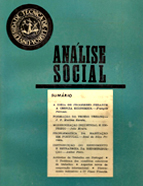

................................
The authors mentioned above had direct links to GIS and its scientific programme. However, Análise Social also opened its pages to historians who were not part of the research team linked to the economics school on Rua do Quelhas. This was the case of Miriam Halpern Pereira, who published her first academic work in Análise Social , taken from her doctoral thesis, which she had just completed in Paris, on demography and development in Portugal in the second half of the 19 th century (Vol. VII, no. 25/26, 1969). This was also the case of Joel Serrão, who prepared a short essay on the history of Portuguese emigration (Vol. VIII, no. 32, 1970). In both texts, we also find a perfect articulation between the historical perspectives in which they are situated and the prevailing concerns in the GIS and Análise Social on the themes of economic development and emigration.
Another author with no connection to the GIS who signed one of the historical studies published at this stage was the Brazilian José Albertino Rodrigues, who devoted an essay to the theme of urban ecology in Lisbon in the second half of the 16 th century (Vol. VIII no. 29, 1970), in line with the magazine’s motivation and interest in the field of studies on the city, housing and urbanism.
Among the younger researchers linked to GIS, who were then preparing their doctoral dissertations, was Vasco Pulido Valente, who was the first to open up a line of publication in which history did not serve as a mere instrument or auxiliary narrative in the service of a global social agenda. Proof of this are the two articles he published in Análise Social on the working classes in the First Republic (Vol. IX, no. 34, 1972) and on the “Revolta do grelo” and social movements at the end of the monarchy (Vol. X, no. 37, 1973). These were the first works in a line of research that would be continued in the historical research carried out by this historian and his colleagues at GIS and, later, at ICS. To conclude the description of this small batch of 13 historical articles published by Análise Social between 1963 and 1974, mention should be made of the three works that César Oliveira devoted to the Portuguese workers’ press in the 19 th century (Vol. X, no. 39, 1973), to the workers’ movement during the 1914-1918 war (Vol. X, no. 40, 1973) and the echoes of the Russian Revolution in the Portuguese press (Vol. X, no. 40, 1973). These articles also heralded the research interests that GIS and Análise Social would consolidate in the following decade.
This work is financed by national funds through FCT - Foundation for Science and Technology, I.P, in the scope of the projects UIDB/04311/2020 and UIDP/04311/2020.
